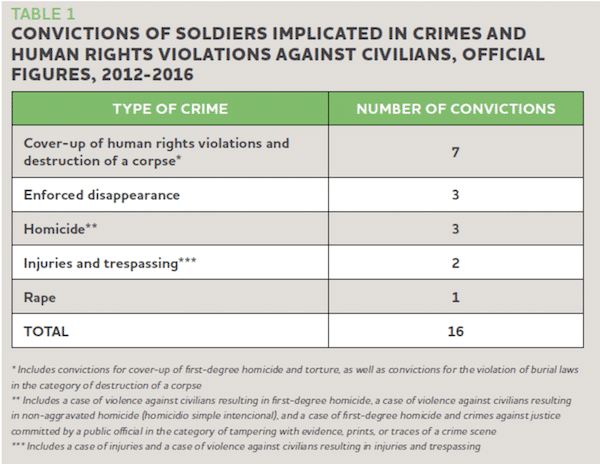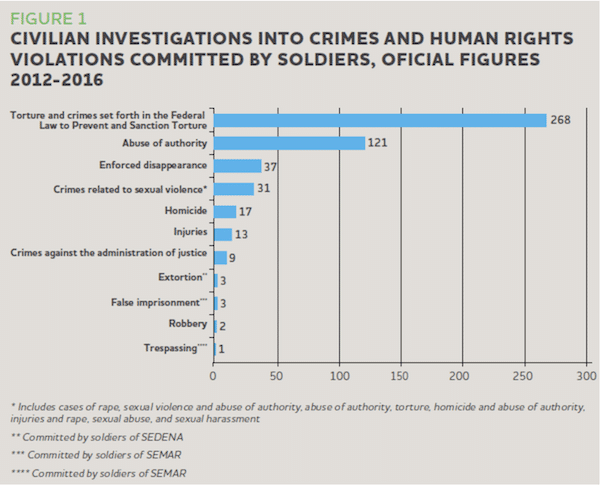A new report reiterates that, despite reforms, Mexico is failing to adequately investigate and prosecute soldiers accused of committing abuses, a reminder of the often negative human rights consequences of militarizing the fight against crime.
According to a November 7 report from the Washington Office on Latin America (WOLA), a 2014 legal reform that transferred cases of military abuse to civilian rather than military authorities has failed to improve accountability for the armed forces.
Impunity is the norm in virtually all cases of alleged military abuses, the report found. Between 2012 and 2016, Mexico’s Attorney General’s Office launched 505 criminal investigations into alleged crimes committed by soldiers against civilians. However, the civilian justice system has secured just 16 convictions, representing a 3.2 percent success rate.

(Credit: WOLA)
A major reason for the low success rate is the ability of military authorities to obstruct or delay civilian investigations, for instance, by witholding, falsifying or tampering with evidence and testimony.
The report’s primary author, Ximena Suarez-Enriquez, told InSight Crime that involving civilian authorities more deeply in the investigation process could be a possible solution to this problem.
“At a minimum, civilians must have control over gathering evidence, chain of custody at the crime scene, and gathering testimonies, as past actions by the military have shown that these are the ways that the military obstructs and impacts civilian investigations.”
SEE ALSO: Mexico News and Profiles
In addition to obstacles put in place by the military, the report found a lack of political will on the part of the Attorney General’s Office has also impeded investigations and prosecutions of soldiers accused of wrongdoing.
“The Attorney General’s Office’s lack of independence is a key factor influencing how it does or does not investigate and prosecute cases,” Suarez-Enriquez told InSight Crime. “Political pressure can influence prosecutions in Mexico and there is a lot of pressure not to investigate when it comes to cases involving soldiers.”
In order to improve the ability of civilian authorities to bring members of the military to justice, the report recommends investing in capacity building for civilian authorities, as well as creating a mechanism to monitor the implementation of the 2014 reform, among other things.
InSight Crime Analysis
The latest WOLA report is a reminder of the negative human rights consequences that have been associated with militarized anti-crime strategies throughout Latin America, and particularly in Mexico. Not only have these policies largely failed in practical terms, but they have also been a “recipe for rights abuses” at the hands of the military. In fact, 2017 looks set to be the most violent year yet witnessed in Mexico’s modern history.

(Credit: WOLA)
Amid the escalating violence, rights abuses by the military as extreme as torture and extrajudicial killings have continued to surface, in large part due to nearly complete impunity for crimes in Mexico.
“The Mexican government needs to show results in paradigmatic cases, such as the Tlatlaya massacre,” Suarez-Enriquez said, referring to the 2014 killing of 22 alleged criminal suspects by members of the military. Last year, a military court acquitted all but one of the soldiers implicated.
“Effectively investigating, prosecuting and sanctioning those responsible in even a set of cases would send a strong signal of the government’s commitment to combat impunity and bring justice to the victims,” Suarez-Enriquez added.
SEE ALSO: Coverage of Security Policy
In an email to InSight Crime, WOLA senior associate for Mexico Maureen Meyer raised concerns about proposals to deepen the military’s involvement in fighting crime.
“Further militarizing public security in Mexico without more controls over soldier’s actions will only lead to more abuse,” Meyer said. “As long as the Mexican government continues to examine legislative proposals to further the military’s role, they must come to terms with the human cost of deploying soldiers with weak oversight mechanisms over their behavior and that of their superiors.”

